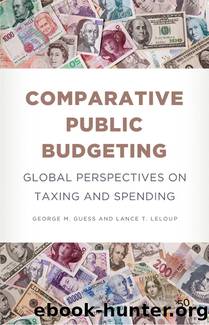Comparative Public Budgeting by Guess George M.;LeLoup Lance T.; & Lance T. Leloup

Author:Guess, George M.;LeLoup, Lance T.; & Lance T. Leloup [Guess]
Language: eng
Format: epub
ISBN: 3407270
Publisher: State University of New York Press
Published: 2010-10-18T00:00:00+00:00
Allocation to Meet Planned Needs
Countries within the FSU/CEE region vary widely in their capacities to achieve âallocative efficiency.â This kind of efficiency means that they can establish priorities within their budgets. Planned budgets reflect resources to be distributed according to the government's priorities and potential program effectiveness. Budgets will also reveal any shifts in resources from old to new priorities (Kasso 2006). The capacity of governments in this region to do this depends on: (1) the proper assignment of intergovernmental roles and responsibilities (i.e., authority and responsibility are matched), and (2) substantive budgeting systems that allocate resources based on need and effectiveness criteria (usually through some form of âtargetingâ system that monitors performance via benchmarks) (see Morse and Struyk 2006, 85â120). In addition, capacity depends on macroeconomic stability since without it revenues will fluctuate wildly. Macroeconomic instability prevents accurate revenue and expenditure forecasting. For instance, MOF releases to ministries and local governments are typically disrupted in order to try and maintain a semblance of fiscal balance and control. Under these conditions, core services such as health, education, and transport suffer badly. Program and service managers need fiscal stabilityâmeaning budget receipts received as planned and expenditure variation kept within the range expected for the fiscal year.
Substantial fiscal management achievements have been made in all five regional sub-areas. Allocative efficiency has increased largely through installation and use of performance-based budgeting systems mainly at the subnational level. With the exception of Central Asia, which remains very poor in most parts and underserved by services and programs, allocative efficiencies are increasingly evident. In large part, they have been attained because of the institutional and cultural features noted aboveâhigh quantitative and statistical skill levels, and general tendencies to work hard where financial and nonfinancial incentives are made clear. In most cases, finance ministries, and regional/local government finance offices have made good use of the technical assistance and training received from overseas assistance programs funded by such donors as IMF, World Bank, USAID, Asian Development Bank, and British DFID.
Nonetheless, three constraints to achieving successful allocative efficiency in this region should be noted:
Download
This site does not store any files on its server. We only index and link to content provided by other sites. Please contact the content providers to delete copyright contents if any and email us, we'll remove relevant links or contents immediately.
Spell It Out by David Crystal(35827)
Life for Me Ain't Been No Crystal Stair by Susan Sheehan(35521)
Cecilia; Or, Memoirs of an Heiress — Volume 1 by Fanny Burney(32029)
Cecilia; Or, Memoirs of an Heiress — Volume 3 by Fanny Burney(31441)
Cecilia; Or, Memoirs of an Heiress — Volume 2 by Fanny Burney(31391)
The Great Music City by Andrea Baker(30762)
Professional Troublemaker by Luvvie Ajayi Jones(29413)
We're Going to Need More Wine by Gabrielle Union(18613)
Twilight of the Idols With the Antichrist and Ecce Homo by Friedrich Nietzsche(18285)
The Secret History by Donna Tartt(18103)
Cat's cradle by Kurt Vonnegut(14728)
All the Missing Girls by Megan Miranda(14636)
Pimp by Iceberg Slim(13757)
Bombshells: Glamour Girls of a Lifetime by Sullivan Steve(13670)
Fifty Shades Freed by E L James(12892)
Talking to Strangers by Malcolm Gladwell(12836)
Norse Mythology by Gaiman Neil(12796)
The Social Justice Warrior Handbook by Lisa De Pasquale(11946)
Underground: A Human History of the Worlds Beneath Our Feet by Will Hunt(11822)
